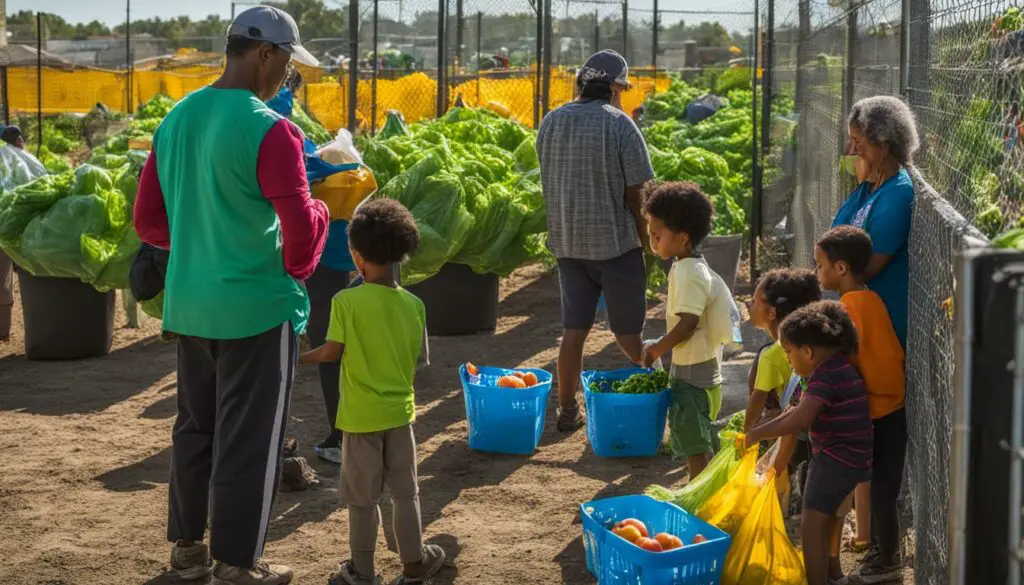Originally posted on November 19, 2023 @ 6:48 pm
Food assistance is crucial for low-income families and individuals struggling to put food on the table. However, there is often confusion and misinformation surrounding the eligibility of illegal immigrants for food stamps in the United States. Many wonder whether or not undocumented immigrants can qualify for food assistance programs and what requirements they must meet.
In this section, we will explore the eligibility of illegal immigrants for food stamps and shed light on the availability of food assistance for undocumented immigrants. We will discuss the general criteria for SNAP benefits and the challenges and considerations that undocumented immigrants may face when applying for assistance.
It is essential to understand the complexities of food assistance eligibility to ensure that all individuals in need have access to adequate nutrition, regardless of their immigration status.
Table of Contents
Key Takeaways
- There is confusion surrounding the eligibility of illegal immigrants for food stamps in the United States.
- Undocumented immigrants may face unique challenges and considerations when applying for food assistance programs.
- Understanding the complexities of food assistance eligibility is crucial to ensure that all individuals in need have access to adequate nutrition.
- Advocacy and support exist for ensuring food security among undocumented immigrants.
- Education and awareness on food assistance programs can help ensure accurate information reaches all communities.
Understanding the Supplemental Nutrition Assistance Program (SNAP)

If you are wondering whether undocumented immigrants can receive SNAP benefits, it is essential first to understand what SNAP is and how it operates. SNAP, formerly known as food stamps, is a federal assistance program designed to help low-income families and individuals afford food. Participants receive an EBT card, which works like a debit card, to purchase qualifying food items at participating retailers.
SNAP benefits for unauthorized immigrants is a complex issue as eligibility is based on a range of factors, including income, household size, and expenses. However, it is important to note that even those who are unauthorized immigrants can have children who are US citizens, and these children may be eligible to receive SNAP benefits.
The program aims to reduce food insecurity and malnutrition while promoting healthier eating habits. To be eligible for SNAP benefits, applicants must meet specific criteria, including income and residency requirements.
Who is eligible for SNAP benefits?
Generally, all US citizens and legal permanent residents who meet income and other eligibility requirements can receive SNAP benefits. Eligibility is determined by household size, assets, and income. Immigrants with legal status who have lived in the US for five years or more are eligible to receive SNAP benefits.
Are undocumented immigrants eligible for SNAP benefits?
Undocumented immigrants are generally not eligible to receive SNAP benefits themselves. However, their US citizen or legal permanent resident children may be eligible to receive benefits. Eligibility for these children is based on their own income and residency requirements.
Overall, it is important to note that SNAP benefits eligibility is complex and varies depending on the individual circumstances of the applicant. Immigrants who are unsure about their eligibility for SNAP benefits can contact their local SNAP office for more information.
Eligibility Requirements for SNAP Benefits

The Supplemental Nutrition Assistance Program (SNAP) aims to provide vital food assistance to low-income families and individuals in the United States. To receive SNAP benefits, applicants must meet certain eligibility requirements, regardless of their immigration status. Here are the general requirements for SNAP benefits:
- Household income must be at or below 130% of the Federal Poverty Level (FPL)
- Household assets must fall below certain limits
- Individuals must have a valid Social Security Number (SSN) or apply for one
- Individuals must be US citizens or lawful permanent residents (LPRs)
- Individuals who are not US citizens must meet certain residency requirements
While the eligibility requirements for SNAP benefits may seem straightforward, the implications of immigration status can make it challenging for undocumented immigrants to qualify for food assistance. However, some immigrants who are not eligible for SNAP benefits may still be able to receive food assistance through other programs, such as food banks and soup kitchens.
It is important to note that eligibility requirements and benefit amounts can vary based on factors such as household size, income, and expenses. To determine if you or someone you know may be eligible for SNAP benefits, visit the Benefits.gov website to complete a screening tool.
“No one should have to go hungry in the United States, regardless of their immigration status. By understanding the eligibility requirements for SNAP benefits, we can work towards ensuring that food assistance reaches those who need it most.”
Immigration Status and SNAP Eligibility

Undocumented immigrants face significant challenges when applying for government food assistance. While SNAP is a federal program, eligibility requirements can vary at the state level, and some states have implemented additional restrictions that can disproportionately impact undocumented immigrants.
To be eligible for SNAP benefits, individuals must meet specific criteria related to income, residency, and employment status. While immigration status is not a primary factor in determining eligibility, it can create significant barriers for undocumented immigrants seeking assistance.
“Fear of deportation and other immigration-related concerns often prevent undocumented immigrants from applying for SNAP benefits, even when they are eligible.”
According to a report from the Center on Budget and Policy Priorities, fear of deportation and other immigration-related concerns often prevent undocumented immigrants from applying for SNAP benefits, even when they are eligible. Some states have also implemented policies that require additional documentation or verification of citizenship, making it more challenging for undocumented immigrants to access food assistance.
Despite these challenges, undocumented immigrants may still be eligible for food stamps in some situations. For example, households with mixed citizenship status (where at least one member is a legal resident or citizen) may still receive SNAP benefits for eligible members. Additionally, some states have implemented their own programs to provide food assistance to undocumented immigrants who are not eligible for federal programs.
Advocates for undocumented immigrants argue that every person should have access to adequate nutrition, regardless of their immigration status. They are calling for more inclusive policies and increased awareness of the eligibility requirements for government food assistance programs.
To ensure that all eligible individuals can access food assistance programs, it is essential to address the unique challenges faced by undocumented immigrants. Advocates and policymakers must work together to create policies that prioritize food security for all members of our communities.
The Public Charge Rule and Food Assistance

For unauthorized immigrants, access to public benefits can be impacted by the Public Charge rule. The policy, which went into effect in February 2020, permits immigration officials to deny green cards to individuals who are likely to become a “public charge” by relying on government benefits for their livelihood.
The rule has been criticized for its potential impact on the health and wellbeing of immigrants, who may be reluctant to seek necessary medical and food assistance for fear of jeopardizing their immigration status. While the rule does not apply to all public benefits, it does impact SNAP eligibility for unauthorized immigrants.
However, it’s important to note that the Public Charge rule has faced legal challenges, and its implementation has been inconsistent. A court injunction in New York, for example, has prevented the rule from being enforced in several states.
Despite the challenges posed by the Public Charge rule, it’s important to continue to promote awareness of the availability of food assistance for undocumented immigrants. Organizations such as the Food Research and Action Center (FRAC) provide resources and education on SNAP eligibility, helping immigrants navigate the system and access the food they need.
State-Level Variations in Food Assistance Programs

Access to the Supplemental Nutrition Assistance Program (SNAP) for illegal immigrants can vary depending on the state they reside in. Some states have implemented policies that restrict or prohibit undocumented immigrants from receiving food assistance, while others have more inclusive policies that prioritize the food security of all their residents.
An analysis by the Migration Policy Institute found that as of 2019, 15 states explicitly prohibited undocumented immigrants from accessing SNAP benefits, while 11 states extended eligibility to some or all undocumented immigrants. The remaining states had an unclear or mixed policy approach.
For example, California is among the states that have taken a more inclusive approach to SNAP eligibility. Undocumented immigrants residing in California may be eligible for food assistance if they meet certain criteria, such as having children who are U.S. citizens or legal permanent residents.
In contrast, Texas is among the states that have implemented more restrictive policies. Undocumented immigrants are generally ineligible for SNAP benefits in Texas, even if they have U.S.-born children.
Table: State-Level Policies on SNAP Eligibility for Undocumented Immigrants
| State | Policy |
|---|---|
| California | Undocumented immigrants may be eligible for food assistance if they meet certain criteria, such as having children who are U.S. citizens or legal permanent residents. |
| Texas | Undocumented immigrants are generally ineligible for SNAP benefits, even if they have U.S.-born children. |
| Florida | Undocumented immigrants are ineligible for SNAP benefits. |
| New York | Undocumented immigrants may be eligible for SNAP benefits if they meet certain criteria, such as having a child under age 18. |
It’s important to note that state policies on SNAP eligibility for illegal immigrants are subject to change and may be influenced by federal policies and regulations. As such, it’s crucial for individuals to stay informed about the policies in their state and seek out resources and advocacy if they face challenges accessing food assistance.
Advocacy and Support for Immigrants’ Food Security

Undocumented immigrants are often excluded from accessing public benefits, including food stamps, leaving them vulnerable to food insecurity. However, some organizations and advocates work tirelessly to ensure that all individuals have access to adequate food, regardless of their immigration status.
One such organization is the National Immigrant Law Center (NILC), which focuses on promoting the rights of low-income immigrants and their families. The NILC provides resources and advocacy support to ensure that immigrants can access the benefits they are entitled to, including SNAP benefits.
Another organization working towards food security for undocumented immigrants is the San Francisco-Marin Food Bank. This food bank recognizes that many undocumented immigrants are not eligible for public benefits and often struggle to put food on the table. As a result, the food bank has implemented various initiatives to reach underserved communities and help provide nutritious food to those in need.
Advocates for immigrants’ food security also work to educate communities about the resources available to them. The New York Immigration Coalition, for example, has launched a campaign to raise awareness among immigrant communities about their eligibility for public benefits, including SNAP. By providing accurate information and resources, these advocates hope to reduce hunger and promote food security among all individuals.
Challenges and Barriers Faced by Illegal Immigrants

Undocumented immigrants face unique challenges and barriers when trying to access food assistance through SNAP. One of the significant obstacles is the lack of eligibility. According to the federal SNAP eligibility requirements, immigrants must have legal status to qualify for benefits. This limitation is a significant barrier for undocumented immigrants who often struggle to make ends meet and provide for themselves and their families.
Moreover, undocumented immigrants might fear that applying for food assistance could lead to deportation. Although the law requires that information gathered during the SNAP application process remain confidential, many immigrants are skeptical, given the current political climate and increase in anti-immigrant rhetoric.
Another challenge is the language barrier. Many undocumented immigrants may not speak English or are not proficient enough to navigate the SNAP application process. This inability to communicate can lead to confusion, misunderstandings, and ultimately, ineligibility for benefits.
Furthermore, many undocumented immigrants work in low-paying jobs and struggle to make ends meet. They may find it challenging to provide all the necessary documentation required to apply for SNAP benefits. For instance, they may not have a permanent address or access to a checking account, which are necessary to complete the application process.
Lastly, the uncertain and precarious nature of their status in the United States is a significant source of anxiety and stress for undocumented immigrants. This stress can make it challenging for them to navigate the already complicated and bureaucratic SNAP application process.
Increased Awareness and Education on Food Assistance
Immigrants, both documented and undocumented, often face unique challenges when it comes to understanding and accessing food assistance programs. There are misconceptions and misinformation about eligibility requirements and the types of benefits that are available. This lack of awareness and understanding can lead to underutilization of these essential programs.
It is crucial to increase awareness and education around food assistance programs, such as the Supplemental Nutrition Assistance Program (SNAP), for immigrant communities. Educational materials should be available in multiple languages and easily accessible to ensure that all communities have the necessary information.
Immigrant-serving organizations and community leaders can play an essential role in promoting awareness and education about food assistance programs. They can provide information about eligibility requirements and the application process, and help dispel common misunderstandings or misconceptions.
Through educational initiatives and increased awareness, immigrants can better understand their eligibility for food stamps and other food assistance programs, allowing them to access these resources when needed.
The Importance of Accurate Information
Providing accurate information about food assistance programs is critical in increasing awareness and promoting uptake among immigrant communities. Misinformation and fear can prevent people from applying for benefits, even when they are eligible.
Immigrant communities may also be hesitant to apply for food assistance programs due to concerns about their immigration status. It is essential to make it clear that eligibility for food assistance programs is based on income and household size, not immigration status.
By providing accurate information and dispelling misconceptions, we can ensure that immigrants have access to the food assistance they need to support themselves and their families.
Advocating for Accessible Programs
Immigrants often face additional barriers to accessing food assistance programs beyond lack of awareness or understanding. Limited English proficiency, transportation challenges, and difficulty obtaining required documentation are just a few of the obstacles that can make it difficult to apply for benefits.
Advocates and policymakers can work to make food assistance programs more accessible to immigrant communities. Some approaches include providing language access services, offering flexible application processes, and reducing documentation requirements.
The Role of Immigration Policy in Food Assistance
Food assistance programs play a crucial role in ensuring that vulnerable populations have access to adequate nutrition, including undocumented immigrants. However, immigration policies can impact the eligibility of unauthorized immigrants for food stamps.
The current administration’s efforts to curb immigration have raised concerns about the future of food assistance for undocumented immigrants. The Public Charge rule, which came into effect in February 2020, could make it more difficult for immigrants to obtain food stamps. Under this rule, individuals who are deemed likely to rely on public benefits, including food stamps, could be denied admission to the United States or be ineligible for a green card.
Immigrant advocacy groups have criticized the Public Charge rule and expressed concerns that it could discourage immigrants from seeking food assistance out of fear of repercussions. This could have significant implications for food security among undocumented immigrants, who already face numerous challenges in accessing public benefits.
Potential Reforms
Despite the challenges posed by current immigration policies, there are efforts to reform the system to ensure that all individuals, regardless of their immigration status, have access to adequate nutrition.
One potential reform is to expand the eligibility criteria for food stamps to include all individuals who meet the income and resource requirements, regardless of their immigration status. Advocates have also called for the reversal of the Public Charge rule, arguing that it unfairly penalizes immigrants who seek necessary public benefits.
Additionally, some states have taken steps to make food assistance more accessible to undocumented immigrants. For example, California has established a program that provides food assistance to undocumented immigrants who do not qualify for federal assistance.
Importance of Inclusive Policies
It is crucial to develop inclusive policies that ensure that all individuals have access to adequate nutrition, regardless of their immigration status. Providing food assistance to undocumented immigrants not only benefits individuals and families but also has broader societal benefits. By improving food security among vulnerable populations, we can reduce health disparities, promote economic stability, and strengthen communities.
Immigrants, including undocumented individuals, make significant contributions to the United States. Ensuring that they have access to necessary resources, including food assistance, is not only the right thing to do but also essential for building a healthy and prosperous society for all.
Conclusion
In conclusion, the question of “can illegal immigrants get food stamps” is complex and requires a deeper understanding of the eligibility requirements of SNAP benefits. It is essential to consider the broader context of food security and the challenges faced by vulnerable populations.
Advocates and organizations are working to ensure that all individuals, regardless of their immigration status, have access to adequate food. However, illegal immigrants face unique challenges and barriers when it comes to accessing public benefits such as food stamps.
Increase in awareness, education, and advocating for inclusive policies can work towards ensuring food assistance reaches those who need it most, regardless of their immigration status. Policies that promote the inclusion of all individuals and prioritize the provision of essential needs, including food security, are vital.
While the current immigration policies may impact the eligibility of unauthorized immigrants for food stamps, there are potential reforms that policymakers can consider to address the issue of food insecurity among the undocumented population.
In summary, by promoting understanding and ensuring accurate information reaches all communities, it is possible to work towards ensuring that no one goes hungry. Let us continue to strive towards creating a society where food assistance is available to all those who need it, regardless of their immigration status.
FAQ
Can illegal immigrants get food stamps?
The eligibility for food stamps for illegal immigrants depends on various factors. While undocumented immigrants themselves are generally not eligible for SNAP benefits, their U.S.-born children or other household members who are eligible can receive assistance.
What is the Supplemental Nutrition Assistance Program (SNAP)?
SNAP is a federal program that provides food assistance to low-income individuals and families. It aims to ensure that people have access to nutritious food, promoting their well-being and reducing hunger.
What are the eligibility requirements for SNAP benefits?
To qualify for SNAP benefits, individuals must meet income and resource limits, reside in the state where they apply, and meet citizenship or immigration status requirements. Other factors, such as household size and expenses, are also considered.
How does immigration status affect SNAP eligibility?
While undocumented immigrants themselves are generally not eligible for SNAP benefits, their eligible family members, including U.S.-born children, may still qualify. It’s important to consider the immigration status of each household member when applying for food stamps.
How does the Public Charge rule impact food assistance for immigrants?
The Public Charge rule considers whether an individual is likely to become primarily dependent on public benefits when determining their immigration status. However, receiving SNAP benefits does not automatically make someone a public charge, and the rule is subject to specific criteria and exemptions.
Do food assistance programs vary from state to state for illegal immigrants?
Yes, food assistance programs, including SNAP, can vary from state to state. Some states have implemented policies that provide certain benefits or alternative programs for undocumented immigrants, whereas others may have more restrictive eligibility criteria.
Are there any organizations that support food security for undocumented immigrants?
Yes, several organizations and advocates work to ensure that all individuals, regardless of their immigration status, have access to sufficient food. These organizations offer support, resources, and advocacy to address food insecurity among undocumented immigrants.
What challenges do illegal immigrants face in accessing food stamps?
Illegal immigrants may face challenges such as fear of deportation, lack of information about eligibility criteria, language barriers, and limited access to documentation required for the application process. These barriers can hinder their ability to receive food assistance.
How can increased awareness and education help immigrant access to food assistance?
Increasing awareness and providing education on food assistance programs can help ensure that immigrants have accurate information and understand their eligibility rights. It can also address misconceptions and promote inclusiveness in accessing food assistance.
What role does immigration policy play in food assistance for undocumented immigrants?
Immigration policy can impact the eligibility of undocumented immigrants for food stamps. Policies may be restrictive or inclusive, and potential reforms can address the barriers faced by this population, ensuring their access to necessary food assistance.
See also:
Leave a Reply